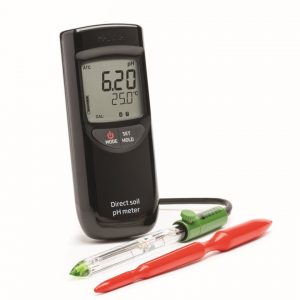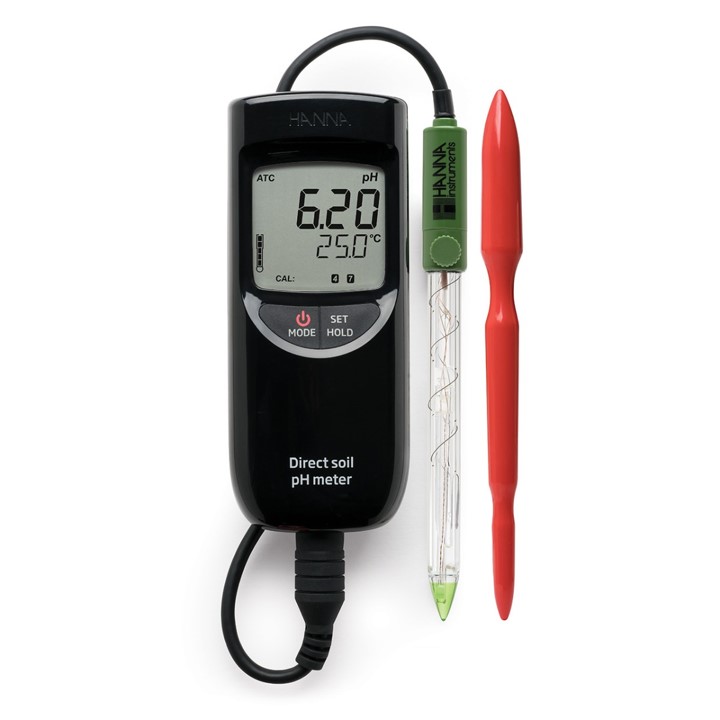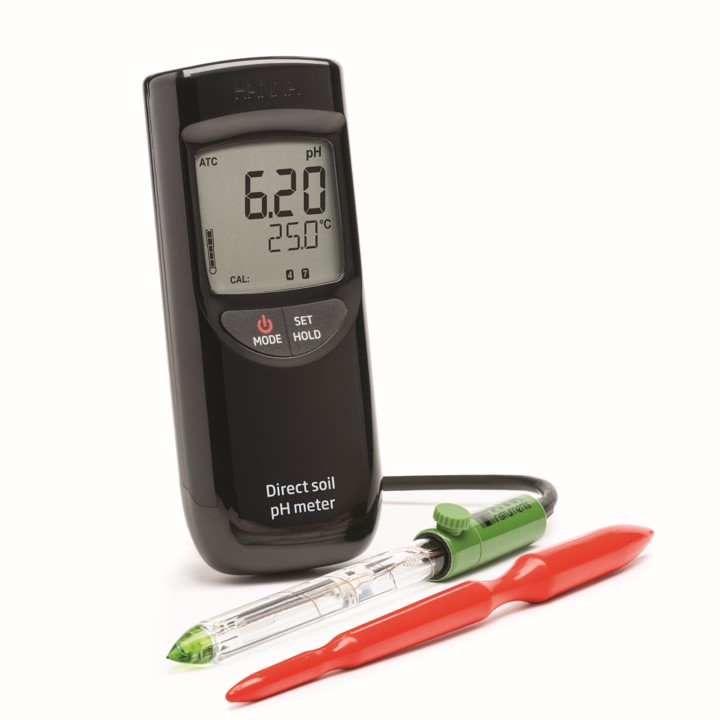soil pH meter
portable soil pH measurements
overview
- Low cost, easy to use soil pH meter
- Portable device for field or laboratory measurements
- Ideal for research, students, agriculture and horticulture
 Measure soil pH and temperature in the field or laboratory with the pH-HH-SOIL meter. The pH of the soil can either be measured directly or a slurry can be prepared. The pH-HH-SOIL meter effectively measures the pH of the soil pore water.
Measure soil pH and temperature in the field or laboratory with the pH-HH-SOIL meter. The pH of the soil can either be measured directly or a slurry can be prepared. The pH-HH-SOIL meter effectively measures the pH of the soil pore water.
features of the pH-HH-SOIL meter
- Specialized soil pH electrode
- Multi-level LCD display
- User friendly operation using only 2 buttons
- On-screen tutorial messages
- Automatic Temperature Compensation
- Automatic one or two point calibration
- BEPS (Battery Error Prevention System) alerts the user in the event that low battery power could adversely affect readings
- Battery % displayed on startup
- Compact, heavy-duty, and waterproof
more details
Soil can be acid, neutral or alkaline, according to its pH value. Most plants prefer a pH range from 5.5 to 7.5; but some species prefer more acid or alkaline soils. Nevertheless, every plant requires a particular range of pH, for optimum growth.
pH strongly influences the availability of nutrients and the presence of microorganisms and plants in the soil. For example, fungi prefer acidic conditions whereas most bacteria, especially those supplying nutrients to the plants, have a preference for moderately acidic or slightly alkaline soils. In fact, in strongly acidic conditions, nitrogen fixing and the mineralization of vegetable residual is reduced. Plants absorb the nutrients dissolved in the soil water and the nutrient solubility depends largely on the pH value. Hence, theavailability of elements is different at different pH levels.
Each plant needs elements in different quantities and this is the reason why each plant requires a particular range of pH to optimize its growth. For example, iron, copper and manganese are not soluble in an alkaline environment. This means that plants needing these elements should theoretically be in an acidic type of soil. Nitrogen, phosphorus, potassium and sulfur, on the other hand, are readily available in a pH range close to neutrality. Furthermore, abnormal pH values, increase the concentration of toxic elements for plants. For example, in acid conditions, there can be an excess of aluminum ions in such quantities that the plant cannot tolerate. Negative effects on chemical and physical structure are also present when pH values are too far from neutral conditions (break up of aggregates, a less permeable and more compact soil).
The pH-HH-SOIL meter features a large multi level LCD screen which displays both pH and temperature readings simultaneously with 0.01 pH resolution and an accuracy of ±0.05 pH. The LCD screen also has indicators for calibration status and stability, as well as on-screen tutorial messages. The pH-HH-SOIL has many advanced features that are found in more expensive portable instrumentation including automatic calibration, buffer recognition,and temperature compensation. The battery percent level is displayed at start up alerting the user to the remaining battery power that is available. The supplied pH electrode is a glass body, amplified pH electrode with a built-in temperature sensor designed specifically for measuring the pH in soils.
specifications
- Range: pH: -2.0 to 16.0 pH; Temperature: -5 to 105 °C
- Resolution: pH: 0.01; Temperature: 0.1 °C
- Accuracy: pH @ 20C: ±0.02; Temperature: 0.5 °C
- Calibration: automatic one or two point calibration with two sets of memorized buffers (Standard 4.01, 7.01, 10.01 or NIST 4.01, 6.86, 9.18)
- Temperature Compensation: Automatic, -5 to 105°C
- Battery Type / Life: 1.5V AAA (3) / approximately 1200 hours of continuous use. auto-off after 8 minutes of non-use
- Environment: 0 to 50°C; RH max 100%
- Dimensions and Weight: 152 x 58 x 30 mm; 205 g
manual
related products
- Portable soil moisture meters
- Soil EC / salinity sensors & meter
- Soil Nutrient Analyzer (measure NH3, NO3-, P, K)



